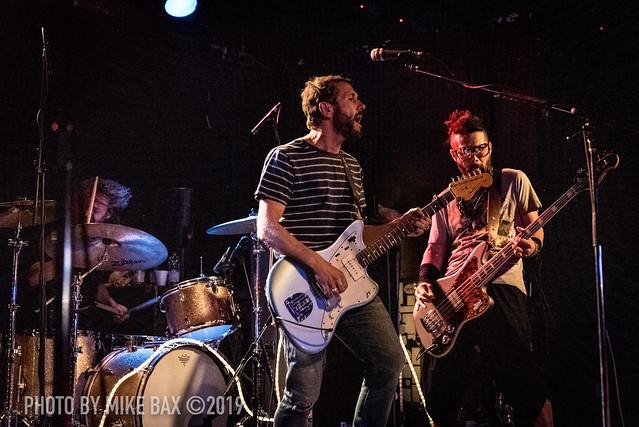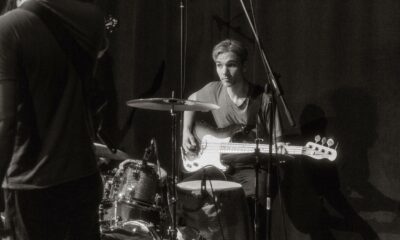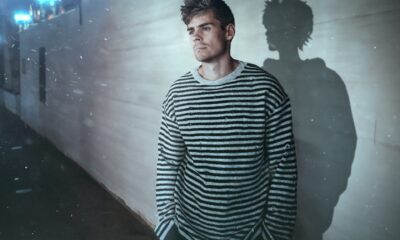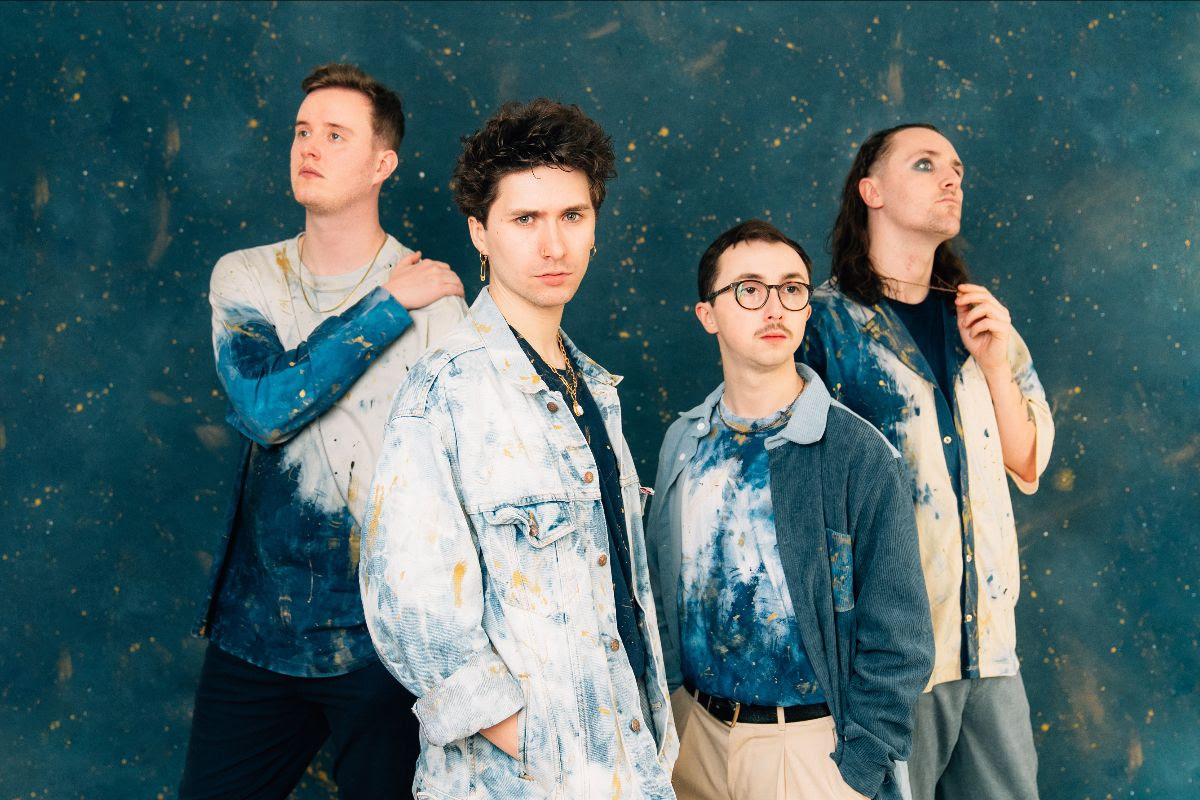Interviews
GRANT NICHOLAS Speaks Out! A Chat About FEEDER, Songwriting, and Longevity in Music [w/ Audio]
Along with a live review and photo gallery taking in all that occurred at Toronto’s Lee’s Palace on May 7th, we also spoke at length with Feeder lead singer Grant Nicholas about the band’s longevity, being on Believe Music now, and their new record Tallulah.

When pressed, I usually cite Grant Nicholas from Feeder or Kelly Jones from Stereophonics as my favourite musical humans. Few modern artists are capable of touching their incredible songwriting ability. Getting the chance to actually SEE Feeder perform live in North America has been a rarity over the past twenty years, so when the band played one of their four North American dates in Toronto a few weeks ago, PureGrainAudio was there for both the show and an opportunity to talk music with Nicholas.
I arrived at Lee’s Palace shortly after the band arrived at the venue. The group and their crew were surveying the place, and taking a look at the limited lighting they would be playing under. Bassist Taka Hirose was Facetiming with his daughter, who was celebrating a birthday as Grant Nicholas approached me and introduced himself. He asked if I’d seen any cool bands at Lee’s Palace, and when I told him I’d seen Husker Du, The Foo Fighters and Mudhoney there, he beamed and said they were playing amongst greatness.
Feeder is currently taking orders for their tenth studio album Tallulah (pre-order here), their first on new label Believe Music. Their Instant Grat single “Fear of Flying” can be streamed now, or delivered to your mailbox for pre-ordering their new album from their online store. With the promise of this new album and a North American presence through their new label, the band hopes to be back on our shores touring Tallulah in the months to come.
Feeder’s Toronto show brought a decent crowd of fans out to see them perform with a unanimous air of disbelief present in the room that the band was actually about to perform a live show in Toronto after more than twenty years. Nicholas expressed his gratitude to the crowd for coming out to see them play, stating he wasn’t sure how many people would turn out to see them given the how long it had been since they’d last performed here. They premiered their upcoming song “Youth” for the first time live in Toronto and went off-book on their setlist towards the end of their show inserting a blistering cover version of “Breed” by Nirvana as their final song of the evening. This was the only show in North America in which they performed the cover.
Grant Nicholas spent 30 minutes with us, discussing his band and their plans for the future. The audio is embedded here for those who would like to listen to the interview. There was a small amount of background noise as the drum kit was being set up, but it doesn’t take away from the audio too severely.
“Fear Of Flying” is taken right from Feeder’s new studio record Tallulah. Check out the official music video!
Maybe given that you haven’t toured over here a little while, How about we get sort of a Coles Notes history of Feeder; where your band started and your trajectory over the past 20 years in the UK.
Grant Nicholas: Well, the band kind of officially started around 1992 and then I met Taka a little bit later. We were originally a three-piece band. I met Jon Lee, our drummer, who is sadly no longer with us, but we met in South Wales, which is where I was born. I moved to London, and then I got a job in a recording studio, and I eventually got Jon to move down. We tried out a few various bands and it eventually turned into this band called Feeder.
We were called Reel originally, which is terrible. We went out and did some shows, and we were very much into the sort of three-piece chemistry, you know, we went to bands like The Police and stuff like that. And (bands) like The Jam and all that kind of stuff. I liked the energy that three-piece bands had. So that was always our original plan.
When we started off, it was in the UK, and it was a really good time, but it was very much about sort Britpop music, and we were a bit more kind of heavier. So we were kind of had this almost mid-Atlantic sound. We appealed to what was happening in the States, the kind of grunge scene as it was called. But we also appealed to quite a few of the Britpop bands because the songs were quite melodic even though they were quite heavy as well. So we started to build this sort of loyal fan base. And then eventually A&R guys started to come down to the shows and noticed another 30 people were coming to each show. And yeah it just got interesting.
It was difficult because we weren’t part of that trendy scene. Britpop is what it was very much about. There was a real scene around it, and we didn’t really fit into that. In some ways, I’m quite glad because it’s given us a long career in some ways. But that’s how we started. And then we made a mini-album called Swim. And then our first album is called Polythene, and we’ve got album number ten coming out soon. That’s not including all the best of singles and b-sides compilations. I think it’s around fourteen if you include all those. So we’ve been going for (it must be) 25 years or whatever.
Check out Mike Bax’s photos from the band’s gig at Lee’s Palace in Toronto on May 7th:
You might not even know this; how many releases have we seen in North America? Is it just Polythene and Comfort In Sound?
Nicholas: Yeah, we’re trying to work out when we came here last. I think we played… we did something for (it’s not called MTV here, is it?)
It was called MuchMusic.
Nicholas: I mean we did this show I can’t even remember where we played. Because we’d been touring with bands like Everclear and stuff like that in the States. I think we might come here with this band, they were guitary, I think called Candlebox. I might be wrong. I’m going back years ago unless we came here and did our own show. I can’t remember, but it must have been 20 years ago.
I was late to the party. I never got into Polythene on release and had to go backward for that one. I picked up Yesterday Went Too Soon new. I’d read about it in Kerrang! or something?
Nicholas: Probably.
Very shortly after that I went into a local store, and it was in their bin, so I scooped it.
Nicholas: Oh that’s good. So Polythene was probably when we were last here. And then we did do some stuff in the States around the second album. And then when we signed to Elektra Records and the album got held back a few times. We didn’t want to release it when they wanted to release it. It’s just sort of fizzled out, really. It’s a shame because it was going really well for us in the States as well. We had a couple of semi-radio hits. A song called “High” did really well, and it was all looking really good.
But the problem is, it’s like you have to keep coming back. You can’t just suddenly expect success. We’ve still got little pockets of fans here and obviously in the U.S. as well. But it’s just so big, you know? It’s just difficult to do. Even for the huge acts, it’s hard to maintain that success. It’s been quite frustrating for us. We’ve been trying to get back here for so long, you would not imagine. So we’d just tackle the stuff as we could. So what this (tour) is, it doesn’t matter how many people we play to. This is just to let people know if there is some interest we’d like to come back and do more. Well, we have to start somewhere, you know? If we can get a little spark going, we’ll see what happens on this on these four shows we’ve got on our little North American tour.
Feeder’s Grant Nicholas standing in front of the world famous Lee’s Palace:
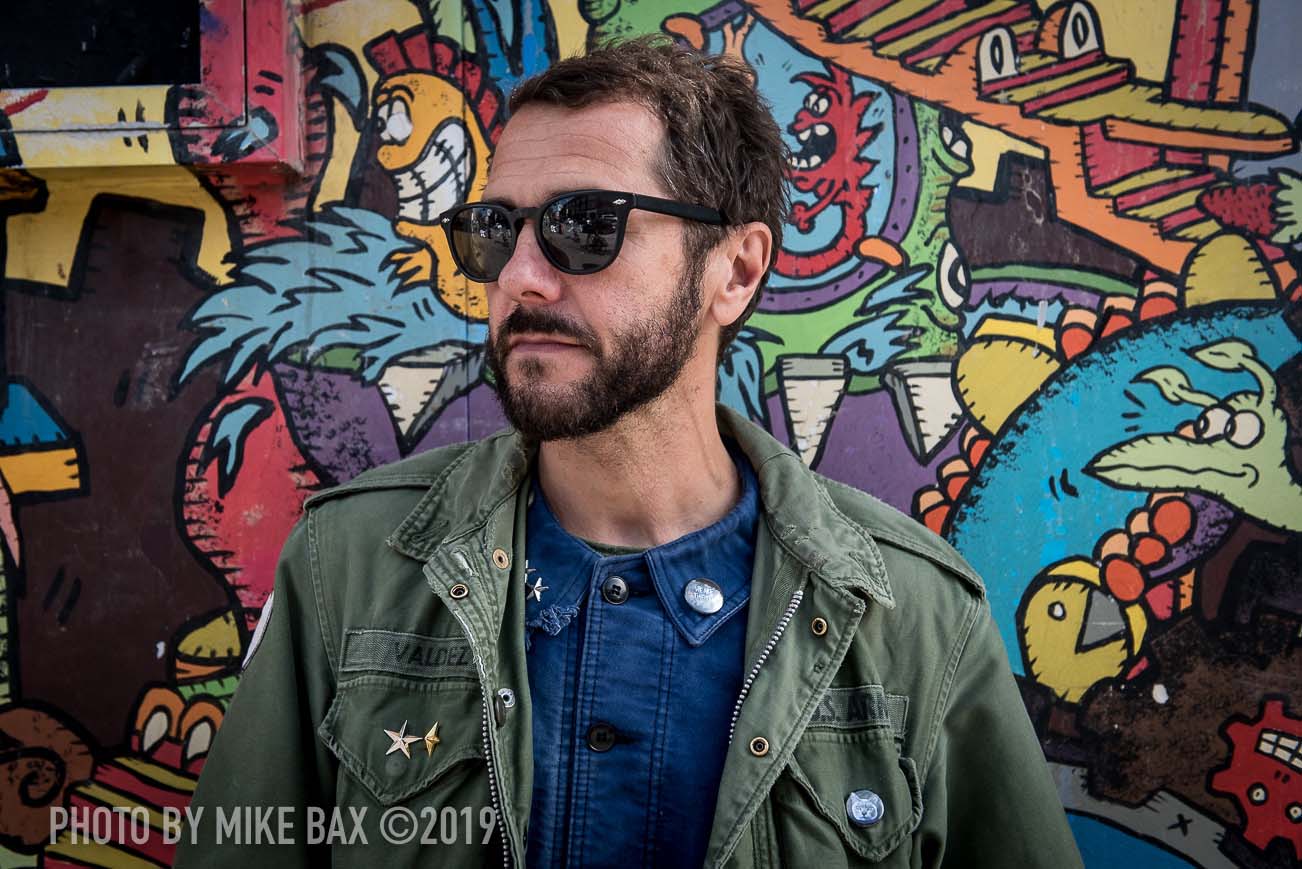
Almost every British band that I’ve talked to that I really admire says exactly the same thing. I listened to James from Manic Street Preachers say that very thing.
Nicholas: I know James, yeah.
You know, saying “we’re just testing the waters. We’re not going to make any money doing these shows.”
Nicholas: We are certainly not going to be making any money (laughs). We’re losing quite a bit. But you know what? The thing is because we’ve obviously done quite well in the UK and some other areas, that helps to fund these sorts of tours. We’re coming here just out of a pure passion of wanting to come back and play, really. We’re going back to playing small clubs. But that’s great. It keeps it exciting. It’s the same with James from the Manics. They are a huge band in the UK but probably here it’s a whole different story.
I think this (venue) might be a bit small for them, but it might not be.
Nicholas: You know, this place has got such a history though. I mean everyone’s played here. Yeah, I’m pretty sure we didn’t play here, but it was a long time ago. I need to try to find out where we played before.
Yeah I’d be curious. I went over the border for your last show opening for Rooney in Detroit. In 2004 I think.
Nicholas: Yeah. Okay, interesting. So what was that, in the States?
It was in Detroit. There was no Canadian date because I think it was around the SARS outbreak…
Nicholas: There wasn’t a Canadian date, yeah. That was quite a fun tour actually. Because that was a massive record for us in the UK. I mean that went double platinum in the UK which was quite big for us at the time. So that’s probably been our (next to our singles and best-ofs) that was probably our biggest selling album. You know it (Comfort In Sound) was an album that I made after Jon died, so it was a very difficult, weird time for us and we just didn’t quite know if the band could still continue.
But I think as a writer, it probably pushed me and made me do things I hadn’t done before. I just came up with this record that really connected with people. And it was massively successful, and that was the album that we came here to the United States with. It didn’t really connect here so much, but I think with just one small tour here you can’t expect that. You know, we did get some radio play, but yeah it was frustrating.
Feeder’s music video for “Youth,” also off Tallulah, was just released last week. Check out the summer-themed visuals!
Given that we were just talking about the Manics, I consider Comfort In Sound and Everything Must Go two of my favorite albums from your respective bands. Interesting that they are albums you and James both created after a member had either died or disappeared, no longer in the lineup anyway. It’s got to be a challenging thing to do? You and Taka must have talked about maybe packing it in back then?
Nicholas: Definitely. I mean we didn’t really speak for while afterwards. We just sort of had a break. I just start to lose the plot a little bit. So I was sort of… I didn’t quite know what to do so in the way I dealt with it was I just carried on writing music, and I’d basically locked myself away with an engineer just on my own in a studio that was quite local to me. And the songs just poured out of me, and I just couldn’t stop writing.
We were demoing just using like sample drums and putting simple bass on. We were building some quite well-structured songs and then after about a month of doing this, I realized I had around ten or twelve not quite finished tracks. So Taka came down to North London where I was living, and I played him some stuff, and he was he seemed pretty blown away with it. I remember going to the pub getting a little bit drunk with him, and that was the night we decided hey you know let’s give it a go. I think he had real confidence in the songs that he had heard.
We decided then to see what happened and it was a massive record for us. We were pretty lucky. But, yeah, I mean, obviously I think we would have made a great record with Jon also. It just would’ve been a different record. Because you know things were going really well for us when Jon died. It was around Echo Park, which was a really big record for us in the UK.
And Feeder went from being just the indie rock band with a cult following to being something else. Like us on supermarket shelves which was quite weird for us because we weren’t ever really that much of a commercial band. We had a couple of very big radio songs on that record. So things were going really well and then so suddenly came to a grinding halt. And anyway I decided to continue, and Comfort In Sound you know came from those writing sessions and recordings.
Tonight is a rescheduled performance from February.
Nicholas: Yeah, we couldn’t get our visas.
But you went and put an album together! It looks to me from the outside looking in like you just went, “let’s go in the studio and bang an album out.”
Nicholas: Do you know what? I didn’t cancel the dates because I was writing an album. I was already in there I’d already start writing stuff. It was purely getting visas, it was an absolute nightmare. I mean we almost couldn’t come again. We only found out on Friday. We were thinking, “oh my God, what we can tell people if we can’t come again? We can’t do this to people. We’re going to have to pay their flights for the people who travel.” Literally, I think the visas were biked over to us on Friday, and one of our main crew members didn’t get his in time. He’s not with us. So he’s not very happy. It’s really difficult now. Just sorting out the American visa stuff. It was a nightmare.
Feeder’s tenth studio album Tallulah will be released August 10th, via Believe.
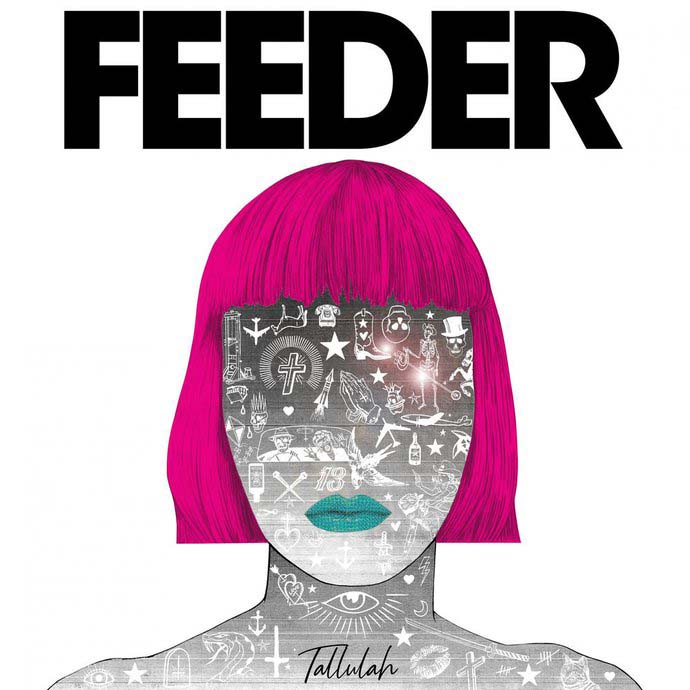
Why you think that is? What’s changed?
Nicholas: I think Trump’s got something to do with it. It’s always been difficult, but it’s definitely getting harder. I know it’s so frustrating.
You have to double down for this, border clearance for Canada and the U.S.
Nicholas: We had to pull all sorts of U.S. strings, pay extra for short things and get all kinds of stuff sorted. But we made it. I’m here. You know we’re here. So it’s all worked out okay in the end.
How much do you want to say about the new album? The new single is out; “Fear of Flying.”
Nicholas: Yeah. “Fear of Flying.” Yeah well, that was a kind of what we call an Instant Grat single. Which means if you pre-order the new album, then you get that single. I really like the track. It’s not like a throwaway single. It was always going to be on our list of singles. There’s probably some more commercial songs. I mean I hate saying the word commercial because it’s always a kiss of death, isn’t it? But it is quite a direct record. There are some good radio songs on there. “Fear of Flying” obviously is one of those, but it just felt like a good first card to play.
It’s always difficult to get to know what to give people because I think fans like you to do something different sometimes. But they also like what you do, so sometimes if you try too hard, it can lose them. Do you know what I mean? But the album is coming out. If you like “Fear of Flying,” there’s stuff in that vein. But there are some very different tracks on there as well. There’s more anthemic stuff. There’s some really mellow stuff. It’s an interesting record, but it’s definitely quite a direct album. Have you heard All Bright Electric? The last album?
Yeah. I dig it.
Nicholas: I really like that record. This is, sonically the way we recorded it is similar. So it’s quite organic-sounding. But I’d say the songs are quite different. There’s probably one or two tracks that would probably fit on All Bright Electric that are a little bit heavier.
I like the nine songs on Arrow, the “secret” album.
Nicholas: Oh yeah? Yeah, that was really just, “Oh, can you write two songs for the Best Of?” And I wrote I think it was one or two that I hadn’t released from a previous recording that I just finished off. Otherwise I just kind of carried on writing. I’m not very good at writing one or two, so if people ask me to write two, I’ll write ten. But we really wanted to have (with the best of) like a kind of new album that came with it. So it wasn’t just living off those past records we wanted to sort of do more.
A lot of those greatest hits albums can be called an excuse to tour. Collect up the best tracks and put an extra song or two on there.
Nicholas: Yeah, right. Exactly. Now people knew that I was writing so was it was quite nice to have that extra bit of work and album’s worth of songs with it. The new album is called Tallulah. And it’s out the 9th of August.
Let’s take you back a few years for the “Buck Rogers” music video, off Feeder’s breakthrough record Echo Park.
On a new label!!
Nicholas: On a new label. It’s a digital label, yeah. We’re involved with it as well. So we had the masters there and ready. They’re more of a digital label. It’s interesting ‘cause we had quite a few offers for the new record and a few of them were labels we’ve been signed to in the past as well. And we just felt we want to try a different approach on this one. You know we’re doing really well on streaming, and it’s a whole different world now. In the UK it’s not just about being on Radio 1 or X or whatever. Now, someone having a massive amount of streaming his track is actually much bigger because you know it reaches a huge audience.
So we’re on this label they kind of really embrace all that. They’re very good at that side of it. So it’ll be interesting to see what happens. But they seem really good so far. They are really young, so it’s quite interesting. It hasn’t got that kind of old school label vibe where you walk in. They’re a bunch of kids really incredibly thorough, and they’re all about kind of numbers and stuff now. They’re very much in that digital world, which I don’t really understand all that well. But it’s quite refreshing, you know? They are really excited about the record.
Was that signing to Believe a part of why all of your material appeared on Spotify and Apple Music?
Nicholas: No. Well, that’s something we’d been trying to do for a while. When we were signed to Echo the head of Echo did not want us to be on Spotify. He was adamant about it. So that’s why we never really had any music on streaming platforms. Obviously, we had started to put stuff on Spotify previous to the deal. But Believe felt that there wasn’t really much on there and it really wasn’t being worked that well. So that did have something to do with us going with them. You must realize we’ve got a massive catalog of music. It seems we’re the perfect band for that really.
You write a lot.
Nicholas: I do, yeah. It’s true. I do write a lot.
I remember I had imported a copy of the CD set of Picture of Perfect Youth.
Nicholas: Oh yeah. The B-sides album.
When it first came out because it was re-released I think three or four years later because it had originally totally sold out. And I loaned it to this guy, and he was like “this is the stuff that wasn’t good enough for your albums.” You know what I mean? He just thought it was amazing. And it’s a b-sides compilation, right?
Nicholas: It is. I mean, it was nice. I mean there was some really experimental tracks on that release as well. It’s quite diverse. And I mean, I really like that record because it shows a lot of sides I was trying to bring into the writing for the Feeder sounds and make it more interesting. You know, we are a guitar-based band, and I write a lot of stuff on acoustic guitar. But I love experimenting with drum loops and keyboards as well. That’s always been a big part of what we do.
Maybe not so much on the first album Polythene because we were more about that guitar-bass-drums thing. But from the second album onward I’ve always been really into exploration. I mean I’m a terrible keyboard player, but I seem to blag my way through it. And then you get a good engineer to make it sound good. But I like that crazy process of trying to write a song or to play something on an instrument that I’m not that good at sometimes. It just brings a challenge. You get interesting stuff happening, you know.
If you want a really amazing part that you can’t play, you can just ask your friend or get a session player. But we’ve always managed to pretty much do most of it ourselves. The b-sides album, it was just nice to really let people hear those songs. Because although they really didn’t make the albums and some of them were b-sides, some of the tracks were actually songs I thought should have been on albums. They should have probably even been singles, a few of them.
Some of my favorite Feeder songs live on that compilation. “Purple” is an awesome song.
Nicholas: Oh right, ok. Yes, that’s an old school rock song, that one.
“World Asleep.” And the Police cover.
Nicholas: “I Can’t Stand Losing You.” That was the last song that we recorded with Jon. Yeah. I remember doing it. We have always loved The Police, and you know, in the early days we used to bleach our hair because we try to look like The Police because that’s what we loved. And then we saw Nirvana and Cobain doing the same thing. And we just sort of totally connected with that.
I’m going to piss Police fans off everywhere, but I play that cover more than I play the original version of it.
Nicholas: You know, it’s a true story apparently, but Sting heard that cover and absolutely loved it. We almost did an MTV awards thing with him. He was to come and play with us. Can you imagine that? I was like, “Oh my God!” And it almost happened. I really wish that it had happened. He thought it was a great version. If you ever meet him, you’ll have to ask him if it’s true. But I was told that from a very reliable source.
I’m “Feeling a Moment” with this hit, off Feeder’s previous record Pushing The Senses.
Are you still a believer in the album format given that everything is going to streaming?
Nicholas: I’ve always been. I am, yeah. Because I love that process. I love the amounts of efforts that go into making a record, and spending hours on the phone and talking to artists and seeing the artwork and getting the credits and you know making everyone who was part of that record know their names are on it, right down to the guy making last tweaks in the studio. To me, that’s what I’ve always loved about music and being a band. I always used to play records and see who produced it or where it was recorded at.
To me, that’s still an important part. It might be a tiny part of the whole system now. But I think real music lovers or people who really love a band who know that we still spend time and still care about that. I still think there is room for a physical product. I could be wrong. I mean vinyl is doing quite well at the moment. So I think if it becomes that point where it’s not going to be CDs anymore, there might still be vinyl. I mean we still do cassettes. And we’ve sold loads of them. You know we would do two different colors, they are the same cassettes, and people buy them both.
Do you think anybody still plays them? Or is it just to have it? Or is it just to have it?
Nicholas: I still play cassettes. It’s like I’ll do a little vocal warm-up idea. Then I can hear exactly what that is in the heads. I don’t know if it’s a novelty thing or whatever but I think kids are quite interested in it. Because you’ll hear kids ask, “Hey, dad, what’s that?” “It’s this thing we used to play albums on,” you know? I think maybe in five to ten years time it’ll be hip to do CDs again and it’ll come back. I don’t know. I mean, I think it’s nice to have what we have. It’s convenient, this whole digital world. But to me, a CD or vinyl is like a piece of art. If you don’t want to play it, just hang it on the wall, you know?
You’ve never been afraid of dropping a digital single though. “Shatter?”
Nicholas: I know, I know. It’s a great way to hear music. I’m totally up for both. I think I embrace both. I’m just saying on a personal level. I still love the process of getting the album sleeve and the titles looking right. I spend hours, even weeks on our stuff. It’s not just us paying some guy and some art company to do it. It does have a lot of thought behind that. I think it feels a bit more like it’s all a part of a process to me, it’s always been that way. I don’t know, I’m sure I’m not the only person that feels that way. But if I am, so be it.
I don’t believe that you (Feeder) have ever done a pledge campaign or a Kickstarter campaign. You’ve never asked your fans to contribute money to help you make music.
Nicholas: No. I mean, I sold my solo album through a Pledge shop as well as through the label I was signed with. But it wasn’t a pledge thing. It wasn’t like you could buy it through them. It was purely just another way of selling it. They didn’t put money in those or get any updates or anything. Otherwise, I’ve never used them. They (crowd-funders) always wanted to do stuff with us. Somehow it didn’t feel right to me. I just didn’t really want to do it. I think the only way that if you ever really wanted to use something like Kickstarter was and is really good is if, for example, that if you wanted to come here and do more shows where the funding is difficult.
There’s only so much the band can put in, you know? Maybe you can raise it there because then you know how many fans you’ve got. You know if you get a rough idea of what size venues you can do and how many shows you can do. That can be interesting. But as far as making a Feeder record goes, no we’ve never used them. We’ve been lucky enough to have a big enough fan base so we still know we can usually do a certain amount (of sales). But it’s not guaranteed. You’ve still got to work hard, you know?
I also don’t believe there is a live Feeder album or DVD available anywhere.
Nicholas: No there isn’t.
Why is that?
Nicholas: I’ve always refused to do one. (laughs)
Are you afraid it would be crap?
Nicholas: Well, well most of them are not even the live gig. They’re always fixed up. I know what goes into them. I’ve got friends to do them for loads of bands, and some really big bands and so much work goes into making it sound good. I mean it always has been, the ‘70s recordings, they would overdub their guitars and stuff.
Kiss Alive part one and two. How live are they, right?
Nicholas: Yeah, I mean, some might be really good live, like the old punk bands but quite a few have had something done. I’m up for doing it now, and it’s not the fear of it, I just thought even if it’s not that great, I just think that unless you are really actually at the gig, it just doesn’t sound the same. When I hear things that have been recorded, I just think “that’s not how we sound. Or that’s not how I imagine we sound.” So I think if it’s done well, I would be up for it. I’ve been asked a lot of times by a lot of our fan base that we’ve got to do a live album one day. So I think it’s one thing we will do. We’ll do it at some point. I’m not sure where.
How many YouTube clips do you look at after a show and think “Oh, they’re all dreadful, they all sound off and misrepresent the music?”
Nicholas: Yeah, I mean the thing is, although the sound quality is really bad on phones, I know it’s annoying that people watch shows on their phones, but it’s just part of touring. It’s annoying, but that’s how it is. But when you see a bit of footage from a phone that people have filmed, sometimes it doesn’t sound that bad because you’re actually getting how the PA out front sounds. So it might be a bit distorted, but you get quite a good (sort of) feel of what the band sounds like whereas when you had stuff recorded through a deck by someone who really knows what they are doing, It can be… I find it worse, sometimes.
But actually recording live sound and doing it well, it’s really difficult. Even when we’ve done massive TV shows in the UK, like we’ve done Jools Holland and stuff that, I’ve always been like “Really? You know, turn the guitar up! I can’t hear the drums.” I don’t know. Some people seem to get a really good sound. I think for rock bands, particularly, it’s quite tricky to get that power unless you’ve got a very good engineer who knows exactly how to do it. But to answer your question, I’m thinking about it. (laughs)
The band’s video for “Piece By Piece” off Echo Park may remind you of your work day.
How much writing do you do for other musicians and other bands. Is that something that you take on?
Nicholas: I get asked quite a lot. I don’t do as much as my publisher wants me to. I should do more, but it’s one of those things where I tend to keep most of it. But I would like to. I have done a few, and I do get asked more and more. I think when people see the “Best Ofs” and stuff like that they realize “oh Jesus they’ve got a lot of songs.” They realize we’ve got 55 singles. Then people think, “oh, he might be interesting.” Sometimes putting a rock guy with a pop artist is really interesting. Yeah, you know it’s more it’s cooler for them, and it’s just different. It’s a whole different world.
Junkie XL did that version of “Broken.”
Nicholas: Yeah I’ve done stuff like that. That was a b-side. That’s been covered twice, that song. There’s a guy called… He’s an old school dude, he’s called Zucchero. He’s huge, massive in Italy. He’s like an Italian Tom Petty, but not as cool. He’s that kind of thing. So an old school, somewhere between that and Phil Collins meets Dr. John. That kind of thing. He covered that song as well. But he sang it in Italian. So he took quite a lot of credit for it even though it’s the same song. So I’ve done a few things but not out of me asking them. They just come in. I’ve done a couple of hip-hop things. I’ve done a couple of things here and there but not as much as people might think I would have done. That’s maybe down to me saying that I’m not sure.
You want to let it go? It’s too good.
Nicholas: I would. I mean if it’s the right thing. Well if it’s a case of doing it with somebody that you really like that be great. Or is a case of “Well here it is. If you like it, take it. If you don’t, that’s fine. Yeah.” But nowadays it’s a sort of writing team; you have to meet up with people and hang out with them. It’s a whole different world. I’ve never really done that before. Something maybe for the future when I’m too old to do this. It’s not something which excites me. It’s something I’ll probably end up doing at some point. Or do more of.
Do you feel like you have a shelf date? At what point are you too old, right?
Nicholas: Probably. You know, I don’t know. It’s very difficult to say, isn’t it? You have to sort of adapt to songs that you wrote when you were 20 years old. So you don’t want to try and kid yourself. But I think if you can do it gracefully, you can do it in a good way and make songs that you wrote many years ago still work where they might be slightly different in the way you do them. That’s fine.
I think I don’t want to feel like I’m trying to do something was I just physically can’t do and feel like I’m making a bit of a fool of myself and embarrassing my kids. I don’t know. I think when it stops being fun and when it feels like where… you know when you feel like it’s time to leave a party sometimes? Sometimes you can get that little bit too drunk and then you don’t realize it’s time to leave the party. I think it’s just knowing when to stop.
When you can leave a party, and just sort of slide at the back door and nobody knows you left?
Nicholas: Yeah. It’s very difficult to completely stop doing something which is in you. I mean, it’s my career, but it’s something which I also really enjoy. So it’s a difficult question because I mean look at the Rolling Stones. I mean they’re still here.
Yeah. A lot of the older guys, I still pay money to go and see.
Nicholas: Well you know you mentioned Foo Fighters earlier. I mean, Dave Grohl is pretty much the same age as me. And he seems to be absolutely loving it. And they are still putting on great shows. You just never know. I like to think we’ve got a bit more left in us.
Well, you’ve got a new label and a new album coming.
Nicholas: Well there will definitely continue to be new music.
Would you say that your approach to writing has changed or grown over the years?
Nicholas: I think it’s simplified it in some way. I definitely tend to concentrate more on the vocals and lyrics up front now. Whereas I used to be all about the guitars first. There were massive guitars everywhere because I love doing the guitars. But now I try and really focus on the song up front now. So I don’t want that pressure of knowing the music’s finished nature so like you wind up waiting for the singer to write the lyrics. So I try and almost like turn it all around now. Although it takes a bit more discipline and a bit more organization up front. I think the songs are better for it and I actually prefer it because sometimes when you get a vocal on track early, you don’t need the 64 guitar tracks… you only need 32.
It’s something which doesn’t always work out that way with the song, but I think I’ve realized that even more after doing that little solo record. It was very acoustic. And it made me have to do it that way because it was just acoustic and vocals. So I brought that sort of discipline to the way I work on some of the Feeder stuff now. I think it’s been a good thing. And it’s definitely made the recording process a little bit more focused. It sort of takes the pressure off a little bit around that horrible thing where you think “I’ve got to do all the vocals at the end.” Which is what often happens within the most albums. So that’s definitely a different approach, but I’m still writing on guitar. You know I’d say about 90 percent on acoustic guitar.
Do you ever write lyrics before you write music?
Nicholas: I have a lot recently. I never used to. I’d get a line or a title of a song. Maybe a chorus or a verse, but now I tend to try and get at least most of them done. Sometimes I’ll only have one verse and sing it twice, and then I’ll come back to finish the second verse, but on some of this new record, literary the lyrics came really quickly. Some early Feeder songs were like that. “High” was like that. It came out very quickly. So that’s changed a little bit. But otherwise, it’s pretty much us doing the same old thing.
-

 Music3 days ago
Music3 days agoTake That (w/ Olly Murs) Kick Off Four-Night Leeds Stint with Hit-Laden Spectacular [Photos]
-

 Alternative/Rock4 days ago
Alternative/Rock4 days agoThe V13 Fix #010 w/ High on Fire, NOFX, My Dying Bride and more
-

 Hardcore/Punk2 weeks ago
Hardcore/Punk2 weeks agoHastings Beat Punks Kid Kapichi Vent Their Frustrations at Leeds Beckett University [Photos]
-

 Culture2 weeks ago
Culture2 weeks agoCirque Du Soleil OVO Takes Leeds Fans on a Unique, Unforgettable Journey [Photos]
-

 Alternative/Rock1 week ago
Alternative/Rock1 week agoA Rejuvenated Dream State are ‘Still Dreaming’ as They Bounce Into Manchester YES [Photos]
-

 Features3 days ago
Features3 days agoTour Diary: Gen & The Degenerates Party Their Way Across America
-

 Culture6 days ago
Culture6 days agoDan Carter & George Miller Chat Foodinati Live, Heavy Metal Charities and Pre-Gig Meals
-

 Music5 days ago
Music5 days agoReclusive Producer Stumbleine Premieres Beat-Driven New Single “Cinderhaze”

